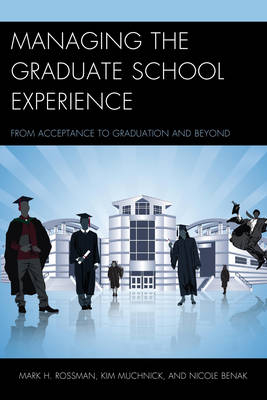
Managing the Graduate School Experience
Rowman & Littlefield (Verlag)
978-1-4758-1794-2 (ISBN)
Knowledge is power. Simply stated, Managing the Graduate School Experience: From Acceptance to Graduation and Beyond provides graduate students with power as it helps them to understand and complete a graduate degree, regardless of how the degree is offered—online or on-campus. It also encourages them to take control of the graduate school process as much as possible and negotiate with faculty and the administration regarding all aspects of the program.
Some additional key features of this book include:
•Experienced faculty members who have served on more than 400 graduate committees, have chaired more than 100 doctoral dissertations and eighty master’s theses, and have instructed thousands of learners on their journey to earning their degree
•Reflections of more than fifty cumulative years of graduate school experience
•A non-technical, no jargon, easy-to-read style. Succinct and to the point
•A Student centered approach that has helped hundreds of graduate students complete graduate degrees
Dr. Mark H. Rossman has been advising graduate students for his entire academic career of more than forty years. He has received two awards as an outstanding dissertation advisor and has written extensively on how to succeed in graduate school. Dr. Kim Muchnick and Dr. Nicole Benak have been involved with graduate education for more than ten years. Along with instructing in online and traditional mediums, they have also earned degrees through traditional and online programs.
Table of Contents
Acknowledgments
Preface
1. Can I Really Complete a Graduate Degree?
Can I Afford a Graduate Degree
How Will Working on The Degree Impact My Family and Job
Am I Too Old To Be Seeking A Graduate Degree?
How This Book Can Help You
Why Am I in Graduate School?
Three Categories of Learners
Motivation
Barriers to Learning
Time Management
Self-Directed Learning
Becoming a Self-Directed Learner
Need for Support
2. Online Courses and Degrees
Development of Distance (or Online) Education
What are the Different Types of Online Courses?
Why Should I Enroll in an Online Course?
What are some differences Between Online and On Campus Classes?
What are some Strategies to Help Me Complete an Online Degree?
How Do I Complete and Hand In Assignments?
What is the Average Age in an Online Class?
How are Online Courses Graded?
How Much Time Will It Take to Complete Courses and the Degree?
What Technology Is Needed To Participate in an Online Course or Degree Program?
How Effective are Online Courses?
Do Online Learners Feel Isolated?
Is “Online” Right for Me?
3. Financing Your Graduate Degree
Federal Sources
State Sources
University or College Sources
Employers
Family
Savings and Investments
Additional Sources
Financial Aid Scams
Graduate School Financial Aid Checklist
4. The Degree Program
Accreditation
Am I in the Right Graduate Degree Program?
Defining the Program of Study
Developing and Completing the Program of Study
Know Yourself
Controlling Frustrations
5. The Graduate Committee
Functions of the Graduate Committee
Roles of Committee Members
Getting to Know Potential Committee Members
Becoming Known by Potential Committee Members
Choosing Your Committee
Committee Member Selection Guide
6. The Comprehensive Exam
Purpose of the Comprehensive Examination
The Comprehensive Examination Process
Evaluating the Comp
Preparing for the Comprehensive Exam
Taking the Comprehensive Exam: Tips for the Written Exam
Tips for the Oral Exam
7. The Proposal and the Thesis/ Dissertation
ProQuest UMI Dissertation Publishing
The Pre-proposal
How to Develop the Pre-proposal
Developing the Proposal
The Thesis/ Dissertation
Connecting the Proposal to the Thesis/ Dissertation
Chapter 1: The Problem
Chapter 2: The Literature Review
Chapter 3: The Methodology
Chapter 4: Presentation and Analysis of the Data
Chapter 5: Summary, Conclusions, and Recommendations
References
Concluding Thoughts
8. The Defense
Understanding the Defense
Preparing for the Defense
What to Do at the Defense
The Decision
9. Now What?
Binding Your Thesis or Dissertation
Copyrighting Your Work
Publishing Your Work
Making Up Lost “Quality Time”
Commencement
Developing an Unofficial Annotated Transcript
The Portfolio Resume
Using the Title “Doctor”
Avoiding Emotional Letdowns
Put Your Degree to Work
References and Suggested Readings
References Cited
Style Guides
Guides to Writing a Proposal, Thesis, Dissertation, or Research Paper
Research and Writing in the Disciplines
| Verlagsort | Lanham, MD |
|---|---|
| Sprache | englisch |
| Maße | 151 x 230 mm |
| Gewicht | 281 g |
| Themenwelt | Sozialwissenschaften ► Pädagogik ► Erwachsenenbildung |
| ISBN-10 | 1-4758-1794-0 / 1475817940 |
| ISBN-13 | 978-1-4758-1794-2 / 9781475817942 |
| Zustand | Neuware |
| Haben Sie eine Frage zum Produkt? |
aus dem Bereich


